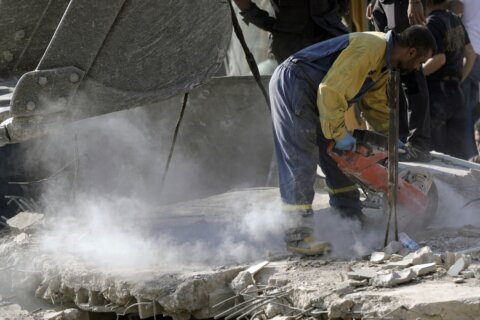Nearby construction can be inconvenient and construction can sometimes last for months, causing excessive noise or even property damage to nearby residents. Whether you have a neighbor who likes to tackle DIY home improvement projects or you live in an urban area with frequent construction, most state and city laws say that you have a right to quiet enjoyment of your property.
Here’s what you should know about dealing with nearby construction and the steps you can take if it becomes too much to handle.
— What are my rights when it comes to nearby construction as a homeowner?
— What are my rights when it comes to nearby construction as a renter?
— How to handle construction disturbances.
— What if your property is damaged during construction?
[See: The Best Real Estate Apps to Download]
What Are My Rights When It Comes to Nearby Construction as a Homeowner?
If your neighbors are renovating their home or building a garage, they must do so in a way that does not ruin quiet enjoyment of your property.
The first step you could take is to approach your neighbor and point out the disruptive construction noise. Request that the work be done during certain times of the day or give you notice about excessive noise.
City ordinances specify acceptable decibel levels throughout the day if there’s nearby construction in your neighborhood. If there’s excessive noise or construction continues outside of those hours, then you have every right to file a formal complaint with your local police department.
What Are My Rights When It Comes to Nearby Construction as a Renter?
As a renter, your options are typically more limited when it comes to nearby construction disturbances, says Ben Farrow, attorney with The Anderson Law Firm, a LegalShield provider law firm. If there’s construction within the building, you can check your lease or building bylaws for more information regarding construction hours. Building construction is typically restricted to between 9 a.m. and 5 p.m., but this varies depending on your city’s ordinances.
However, your best course of action is to talk to your landlord or condo or co-op board about construction noise. Your landlord could offer you a vacant unit away from the construction noise or notify residents when noise is expected to occur.
If construction noise continues to interfere with the quiet enjoyment of your apartment after reasonable measures were taken, then you may be able to pursue a constructive eviction and break your lease. A breach of quiet enjoyment can also occur if construction prevents you from accessing your home.
Depending on where you live, your landlord may be liable for a full or partial refund of the rent you paid during this time. Not all state laws specifically address claims of constructive eviction. In this case, you may have to bring your case before a judge to make your argument.
[READ: What Is an Appurtenance in Real Estate?]
How to Handle Construction Disturbances
Farrow explains that there are typically ordinances within city limits for both owners and renters that prohibit excessive noise that interrupts peace and quiet between certain hours.
“Let’s say my neighbor’s building a barn out there or a garage,” Farrow says. “I can ask them to only make these noises inside typical working hours.” If you live out in the country, there are typically no ordinances to limit noise. “They can use their property how they want just like you can use yours how you want,” he explains.
You can call your police department’s nonemergency line to make a noise complaint about nearby construction. You may also be able to file a complaint by filling out an online form. Visit your local authority’s website for more information on how to file a formal complaint.
As a tenant, any complaints regarding construction must be taken up with the landlord. “My remedy would be to go to the landlord and say, ‘Hey, I don’t have the quiet, peaceful enjoyment of my apartment. Do you have a substitute that I could use?'” Farrow says.
[READ: Can You Negotiate Rent?]
What if Your Property Is Damaged During Construction?
While nearby construction can be noisy, it could also lead to potential property damage. Depending on who is funding the construction, a private developer, local government or even your neighbor could be held liable for any property damage during construction.
For example, Farrow says that if your neighbor cuts down a tree and it falls on your property, your neighbor is fully responsible for any damage. “But if a subcontractor cuts down the tree and it falls on my property, I have a claim directly against the subcontractor for negligence and directly against the landowner for hiring a tree cutter that doesn’t know what he’s doing,” Farrow says.
An insurance claim must also be filed if nearby construction results in property damage. “We tell people to make a claim on their own homeowners insurance because your insurance wants to make sure you’re happy and keep collecting that premium,” Farrow adds. “The downside is you will pay your deductible but you can get your deductible from your negligent neighbor and tree cutter.”
If construction damages your apartment unit, then it’s considered a breach of implied warranty of habitability. This is a guarantee that a rental property meets basic living and safety standards throughout its occupancy. If the landlord is unable to address damages within 30 days, then you can break your lease and move out.
More from U.S. News
10 Ways Millennials Are Changing Homebuying
Driveway Ideas to Maximize Curb Appeal
The Best Free Interior Design Apps of 2023
What Are Your Rights When It Comes to Nearby Construction? originally appeared on usnews.com
Update 05/03/23: This story was published at an earlier date and has been updated with new information.







